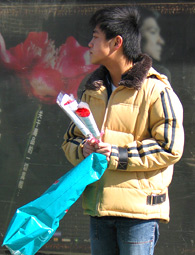A group of gays and lesbians in Beijing have held the country's first public appeal for the support of same sex marriage in China.

A gay man handing out red carnations wrapped in leaflets calling for the acceptance of gay love and marriage in eijing's central business district on Feb 14. (Photo by Dinah Gardner)
"Love has no boundaries; it is nothing to do with gender," the flyer read. "We are homosexuals. We also want a life together with our loved one… please support all kinds of partnerships and all kinds of love. Please support same sex marriage."
This kind of action is very unusual in China; unauthorised public protests are usually broken up the police. In 2005 a gay and lesbian culture festival was broken up by the police on the grounds the organisers had not sought permission to hold the event.
"We were concerned about security, we had lots of meetings about that," said Xian, one of the protest's lesbian organisers.
"This is different, our action can be considered kind of political. So we chose this area because we think there will be less police here. Also there are a lot of white collar workers here, higher educated people, the group we are seeking support from." Their protest, which lasted about 20 minutes, went ahead undisturbed.
Many of those who accepted the flowers said they supported the action and gay marriage in China.
"I think it's only fair; it's everybody's right to get married," said Liu Peng, a 21-year-old student of banking. "I support them. I think it's great."
"I don't know when China will have gay marriage," he added. "Not now, but in the future I think China will have gay marriage but I can't say when, maybe far in the future." Lie said he was not gay.
Rain Xia, a 25-year-old straight male said: "It's kind of surprising to get this kind of thing [public call for gay marriage]. I never expected it was this. But I can understand them and I support them. It's a human right for everyone to be able to get married."
But not everyone was so sympathetic. His colleague, Christina Wang, said she did not support the protest.
"I don't support this because of my religion," the 31-year-old headhunter, who is married, said. "I am a Christian and I don't think it's right. I don't think it's healthy to be gay."
Xian said she felt it was the right time to make this kind of protest because China's gays and lesbians are growing more confident.
"We're doing it now because there are now so many lesbians ready to come out and to stand up for their rights," she said. "When we started organising this we had no trouble at all finding people. In fact we had trouble finding boys." Only one gay man helped hand out flowers.
Ming Ming, who was helping to film the protest, said she was surprised how attitudes towards gays have changed over the past few years.
"Compared to a few years ago people seem more open to gays and gay marriage and more accepting. The change is really noticeable."
Xian said she was happy with the way the protest had gone.
"I think it was a success," she said. "People said they supported us. One girl took a flower and said it's great because she's a lesbian too."
While life has become easier for China's urban gays and lesbians and the media has become more queer friendly, many homosexuals still end up in conventional marriages because of familial and societal pressure.
Renowned sexologist, Li Yinhe, has submitted proposals to legalise gay marriage in China three times at the annual meeting of parliament. Each proposal was rejected. The country's gays and lesbians were hoping she would submit a fourth proposal this month, but Li wrote in a recent blog entry that she was retiring from campaigning for sexuality-related civil rights because of pressure from her higher-ups. The professor at the Chinese Academy of Social Sciences as once listed as one of China's 50 Most Influential People by Asiaweek magazine.
"Gay marriage is not something that our country can accept at this stage of its cultural development," wrote Li. "History will change when it must. And perhaps I will only be able to be a bystander when the change comes, rather than a participant."
